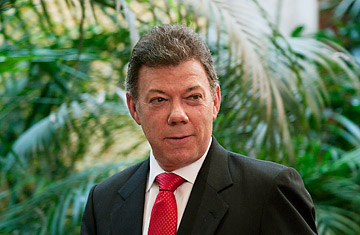
Juan Manuel Santos, President of Colombia
Colombian President Juan Manuel Santos arrived in New York City for the 2010 U.N. General Assembly session on the heels of a major victory: on Sept. 22, the Colombian army conducted a jungle raid on the rebels of FARC (the Revolutionary Armed Forces of Colombia) that resulted in the death of an estimated 20 guerrillas, including Jorge Briceño, also known as Mono Jojoy, the rebels' No. 2 commander. For Bogotá, the win was just the latest advance in the government's counterinsurgency program known as Plan Colombia, which has received more than $5 billion in U.S. aid since 2000. Since that time, the size of FARC has roughly been halved to the current total of about 8,000 members. But those numbers have also been a source of controversy, as members of the army have been proven to inflate the total by killing civilians and then dressing the bodies in rebel uniforms. While in New York City, Santos spoke to TIME about Mono Jojoy, counterinsurgency strategy, relations with Venezuelan President Hugo Chávez and the current state of affairs in Latin America.
Why is the killing of Mono Jojoy important?
This is probably the strongest and most important strike that we've made against FARC. This guy was sort of a myth. He was a military commander. He was the one who kept the discipline in the organization. Very cruel, very tough. What is more important than even striking down a guy with that prestige or control was that we struck the heart of FARC. And I'll give you an example of the importance of what happened. When we struck at this other guy [Raúl Reyes] in Ecuador, we discovered three computers and eight memory drives. This time we found 12 computers and 60 memory drives. What we think we are going to find there is information about FARC activity. What we managed to do with the last strike with this other guy with the information, for example, was Operation Check. There was a lot of information used to rescue the kidnapped people. This is really, I think, the beginning of the end.
Are there lessons that can be learned from Colombia that can be applied to other countries like Mexico that are dealing with drug problems as well as long-running insurgencies?
I don't negotiate with terrorists. You must give a very clear signal. Free the kidnapped people and cease the recruitment of children and terrorist activities, and then we talk. If they don't do that, we're going to continue the pressure. We have put in place a policy that we started back four years ago, when I was Minister of Defense, called the consolidation of the territory. We come in with the military and clean out. The guerrillas retreat, but then you put in police and then come with the state, with doctors, with lawyers, with roads. And, especially, you give the peasants an alternative to the coca that they are growing. So you give them property titles. That really changes their attitude. They become defenders of the establishment, they start giving you information. If FARC were to come back, it would be rejected.
